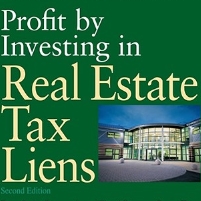Property Tax Lien Foreclosures: Homeowners Lose; Banks and Local Governments Win
Thursday, July 12, 2012
 (book by Larry B. Loftis)
(book by Larry B. Loftis)
An often overlooked, but nonetheless important aspect of the foreclosure crisis has involved property tax lien foreclosures.
When a property owner falls behind on mortgage payments, local governments can impose a tax lien that, if not paid off, can result in foreclosure proceedings. In order to secure revenue, the governments sometimes sell the liens to private investors, who, in some instances are able to recover interest at rates of 18% to 50%.
Complicating the problem are tax sale procedures that are understood by only investors and purchasers. As the National Consumer Law Center put it in its report:
“Inadequate notice and a lack of judicial oversight over the process leave many homeowners in the dark about steps they can take to avoid a home loss. Homeowners most at risk are those who have fallen into default because they are incapable of handling their financial affairs, such as individuals suffering from Alzheimers, dementia, or other cognitive disorders.”
A homeowner may owe less than a thousand dollars on a house worth $200,000, and yet it may be sold at a tax lien sale for the amount of the tax that is owed. The lien buyer, be it a bank or a speculating investor, makes a huge profit, while the homeowners lose not just their home, but the equity that might represent their life savings.
Property tax delinquencies are estimated to be $15 billion a year. The center recommends that states and local governments reform their property tax lien laws to preserve homeownership.
“Property tax collection procedures should encourage repayment rather than property loss,” according to the report.
-Noel Brinkerhoff, David Wallechinsky
To Learn More:
Executive Summary (by John Rao, National Consumer Law Center) (pdf)
The Other Foreclosure Crisis: Property Tax Lien Sales (by John Rao, National Consumer Law Center) (pdf)
Bailed Banks Reap Profits Buying Homeowner Tax Debt (by Noel Brinkerhoff, AllGov)
Banks and Hedge Funds Move into the Property Tax Collection Business (by Noel Brinkerhoff and David Wallechinsky, AllGov)
- Top Stories
- Unusual News
- Where is the Money Going?
- Controversies
- U.S. and the World
- Appointments and Resignations
- Latest News
- Trump Orders ICE and Border Patrol to Kill More Protestors
- Trump Renames National Football League National Trump League
- Trump to Stop Deportations If…
- Trump Denounces World Series
- What If China Invaded the United States?






Comments